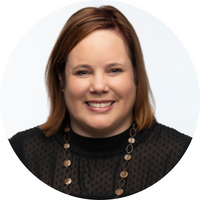
When did you decide a laboratory career wasn’t what you most wanted?
I was fully convinced that I was going to work in the lab from the time that I declared chemistry as my major. However, after spending an entire summer in the lab between my junior and senior year of college, I discovered that my strengths and personality traits were not a good match for a long-term lab career.
Did you make a proactive decision to pursue a career outside the lab, or did an opportunity present itself?
I was fortunate to have a progressive/forward-thinking research advisor during undergrad who really got to know me as a person, not just a student. When I became frustrated with lab work, I came to my professor thinking that I had failed as a chemistry major because I was not excited about doing lab work after college. He was the person that first mentioned patent law as a fit for my strengths/personality. He gave me information about patent law as a career, and he encouraged me when I shifted gears to apply to law school. I am forever grateful to my professor for understanding me, and being such an encouragement.
What were your priorities as you assessed the various non-traditional career opportunities available to you?
My priorities focused on identifying a career where I felt like I could use my strengths – being detail-oriented, finding solutions to problems, having good writing and analytical skills – to benefit others, namely, inventors and/or business owners.
Was this a rational, logical decision, or did your gut just tell you this was the right answer?
I believe that it was ultimately a rational, logical decision, but I did feel that my gut told me that patent law was the right path for me after I investigated further following the discussions with my research advisor.
In what ways, either directly or indirectly, does your non-traditional career make use of your previous scientific training?
I use my previous scientific training, particularly related to problem-solving, on a daily basis. While I do not necessarily have to use my academic coursework/training every day, I believe that it helps me to relate to the inventors who are my clients, as we speak a similar language.
Mastering scientific concepts or legal concepts – as you look back, which seemed more naturally suited to your brain?
At a high level, mastering scientific concepts was more naturally suited to my brain. This is one of the biggest challenges for those of us who go to law school to do a specific kind of law because we have to master legal concepts in all different areas of law, not just our chosen area of law.
Do chemists and chemical engineers – generally – sufficiently understand the challenges associated with protecting intellectual property (IP)? If not, what are the implications?
I believe that chemists and chemical engineers are getting more education about protecting intellectual property (IP), but more can be done. In my practice, I see chemists and chemical engineers who miss out on protection for their inventions entirely, or have their rights limited, because they did not sufficiently understand the challenges. It would help if there were IP education starting at the undergraduate level to get chemists and chemical engineers off on the right foot whether they go into industry, stay in academia, or go on a non-traditional career path.
How would you assess our nation’s enforcement strategy for protecting its companies’ IP?
Unfortunately, we do not have opportunities for enforcement that are fully accessible to all who have protected their IP rights. We are making progress with copyrights with the introduction of the CASE Act, which has established a small claims court for copyright infringement. This has the potential to allow individuals or small businesses to enforce their copyright rights in a cost-effective and efficient manner. However, we do not have similar avenues available for trademarks or patents yet, although there is some discussion of it being a possibility in the patent context.
When you look forward over the next 3-5 years, how might the world of IP evolve? What should we be doing now to prepare?
We are seeing new areas of technology emerge, such as electric and/or self-driving vehicles, blockchain, and the like, and the patent system needs to catch up in terms of educating examiners on the emerging technology as well as making sure that the laws/procedures related to examination allow for the emerging technology to be protected.
Also, the Patent Office and the courts continue to struggle with how software should be protected, if at all, and this is going to be an area that needs to get resolved, especially as all areas of technology incorporate software, and there are innovations happening with it.
As chemists, whether we are inventors or patent attorneys, we cannot be closed off to things that are going on in other areas of science/engineering because the world is becoming increasingly more interdisciplinary, and we need to keep up to be able to contribute effectively.
Looking back, how would you assess the performance of your university in making you aware of non-traditional career opportunities? What might it do differently?
The university could have done better in making us aware of non-traditional career opportunities, but I think there have been significant improvements in this area since I graduated in 1999, which is encouraging. It is important that universities tap into the resources in their communities as well as their alumni to make sure that students are aware of their options. Even though I am not working in the geographical area where I went to school, I have made efforts to connect with universities in my area to help in educating students about options to become attorneys or patent examiners. I also connect with students from my alma mater when I can to offer advice and put them in touch with people who may be able to advise about different career opportunities. In ACS, we also have great resources in our members to educate students about these non-traditional career opportunities.
What is the most gratifying aspect of this career?
The most gratifying aspect of my career as an IP attorney is working side-by-side with my clients to counsel and assist them in protecting their intellectual assets. I enjoy seeing what inventors develop that can be patented, what trademarks are created for products/services, and what creative works can be protected through copyrights. It is something new every day.
What advice do you have for someone interesting in moving into this field?
If someone is interested in moving into a career in intellectual property (IP), it is important to understand what you want to have as your focus. For example, if you are going into patents and want to file patent applications, you should focus on taking the patent bar exam as soon as possible because you can take the patent bar exam without being an attorney (i.e., you can practice first as a patent agent). Being qualified to practice before the Patent Office, whether as a patent agent or a patent attorney, by passing the patent bar exam will make you more marketable for law firms or companies even if you have no other experience in the field.
If you could select a total of three scientists/business leaders – deceased or alive – to support you on the project of your choice, what project would you pick, and who would you put on the team?
My passion throughout my career has been STEM education, particularly making sure that girls have the chance to explore and get excited about STEM education as young as possible. I want girls to know that they can do anything that they want (i.e., careers are not gender-specific). While there are many people that would be qualified and desirable to help on this STEM education and empowerment project, if I were to select a total of three, I would select the following:
- Gertrude B. Elion won the Nobel Prize in Medicine in 1988, and she was quoted as saying “[i]n my day I was told women didn’t go into chemistry. I saw no reason why we couldn’t.”
- Justice Ruth Bader Ginsberg was always passionate about women’s equality and making sure that women can enter any field that they wish. One of her most memorable quotes about the Supreme Court was, “I’m sometimes asked, ‘When will there be enough [women]?’ and my answer is, ‘When there are nine.’ People are shocked. But there’d been nine men, and nobody’s ever raised a question about that.”
- Dr. John D. Simon was my research advisor and physical chemistry professor at Duke University. He encouraged all students to explore different areas of science/technology, and his lab represented gender diversity. Even when he moved on to later become President of Lehigh University, he focused on the importance of providing broader access to education and addressing the issue of inequity noting “It must be – and is – an institutional imperative to make certain that opportunity [for transformative potential through a higher education degree] extends to all.”

Kirby B. Drake is the Founder and Managing Partner of Kirby Drake Law PLLC in Dallas, Texas.
Since 2002, Ms. Drake has focused her efforts on helping clients successfully navigate their intellectual property (IP) challenges, whether those challenges relate to patents, trademarks, trade secrets, or copyrights. She has a special focus on the patent process, as she is a registered patent attorney.
Ms. Drake is active in the American Chemical Society, both on the local and national levels. Most recently, she served as Chair of the National Committee on Patents and Related Matters, and she currently serves on the National Committee on Constitution and Bylaws (C&B). Ms. Drake also serves as a Councilor for the Dallas-Fort Worth Local Section, and she is an active member of the Division of Small Chemical Businesses (SCHB).
The opinions expressed in this article are the author's own and do not necessarily reflect the view of their employer or the American Chemical Society.





